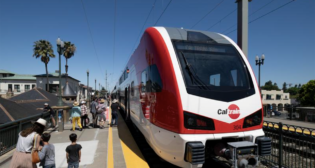
Crosbie crosses out NJT
Written by William C. Vantuono, Editor-in-ChiefNew Jersey Transit will have to resume its search for a new Executive Director, as William Crosbie, who was hired by the agency in early April to replace Veronique “Ronnie” Hakim, unexpectedly and abruptly changed his mind.
“The decision came as a surprise to us because of the level of mutual enthusiasm we both shared when he accepted the offer,” said New Jersey Acting Transportation Commissioner and NJ Transit Board Chairman Richard Hammer in a statement.
Officially, Crosbie cited concerns over relocating his family to New Jersey from Virginia. But a source told Railway Age that Crosbie was asking for a long-term, high-dollar contract, “and that would have never flown. It’s hard to believe that wasn’t discussed more before the NJT board voted on Crosbie’s appointment. Besides, isn’t relocating your family something you think about well before you accept a job?”
According to another source, the long-term, high-dollar contract Crosbie wanted would have been for five years and would have included a buy-out clause guaranteeing all five years of his salary: “Crosbie, after the board hired him, came to realize that New Jersey will be electing a new governor in 2017. Politics in that state being what they are, whoever is elected will almost certainly install their own NJT Executive Director, forcing Crosbie out after less than two years on the job. This is why he was insisting on a long-term contract with a platinum parachute. The board obviously found that unacceptable.”
There is precedent for short-tenured NJT Executive Directors, as at least two were forced out following a change at the Statehouse in Trenton, or when a scapegoat was needed to take the blame for major system problems resulting from natural disasters. In 2002, Gov. James McGreevy, a Democrat, forced out Executive Director Jeffrey A. Warsh, who had previously served as a Republican New Jersey State Assemblyman. Interestingly, McGreevy two years later resigned the governorship amid a lurid sex scandal.
More recently, current New Jersey Governor Chris Christie forced out NJT Executive Director James Weinstein, blaming him for the catastrophic damage to NJT railcars and locomotives at the agency’s Meadows Maintenance Complex in Kearny, N.J., during Superstorm Sandy in October 2012. NJT was criticized for its decision not to move rolling stock out of the MMC, which was heavily flooded.
Christie also blamed Weinstein for operating problems following Super Bowl XLVIII—billed as “the first transit Super Bowl”—on Feb. 2, 2014. More than twice as many Super Bowl-goers as projected opted to ride NJT trains to the game at MetLife Stadium. Following the lopsided game (dubbed the “Stupor Bowl”), during which many bored fans left early, it took several hours to transport everyone out of the stadium, even though NJT supplemented the trains with buses.
Interestingly, at the time of Weinstein’s dismissal, Christie was embroiled in a major political scandal, “Bridgegate,” in which members of his administration were accused of engaging in a conspiracy to shut down entry lanes to the George Washington Bridge in Fort Lee, N.J., to punish the mayor of that town for not supporting the Governor during his 2013 re-election campaign. Some observers said that Christie, who to this day has denied knowledge of the incident, forced Weinstein to resign as part of his attempts to deflect attention from himself.



